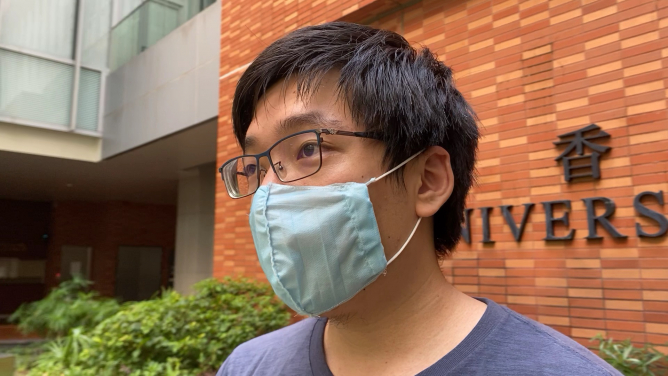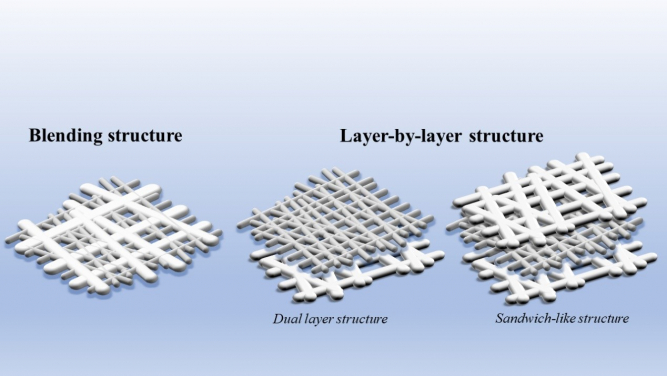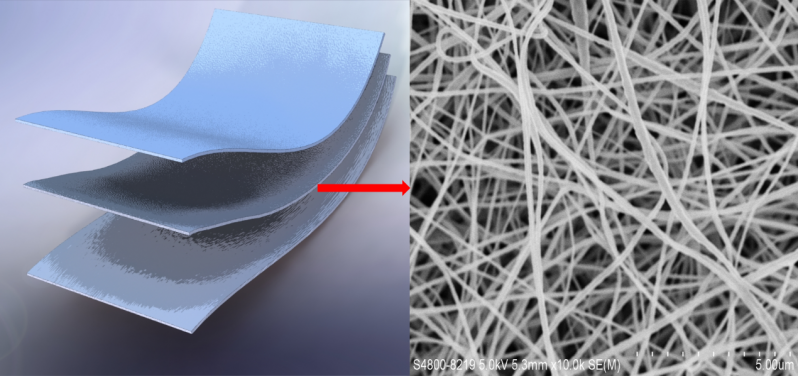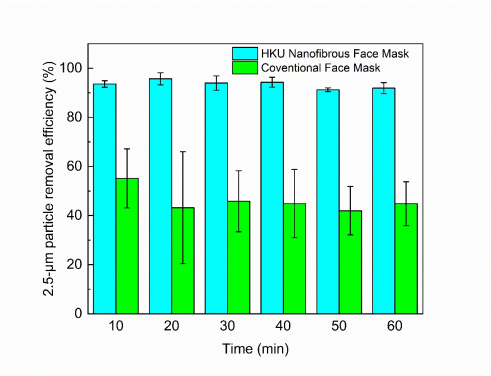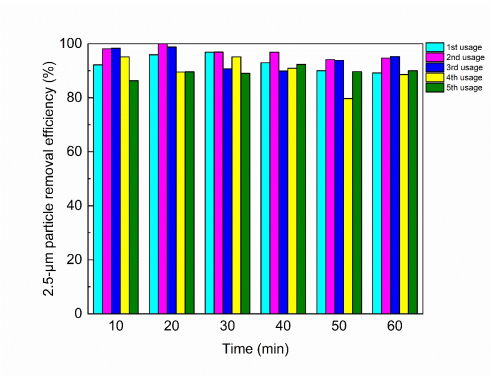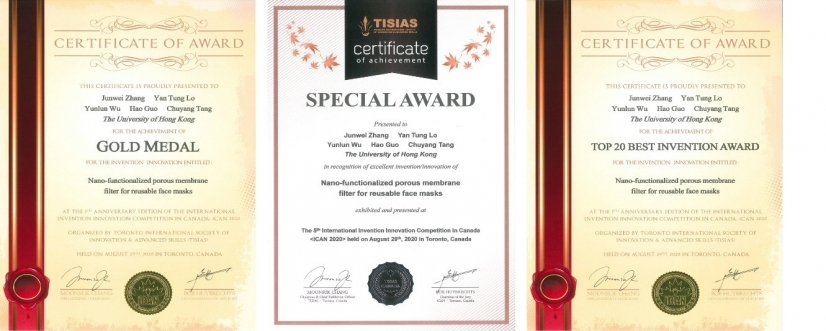Media
Fight COVID-19: HKU Engineering student team invents reusable nanofibrous face mask
21 Sep 2020
A team of undergraduate students, led by Mr Junwei Zhang and Ms Yan Tung Lo and under the supervision of Professor Chuyang Tang and Dr Hao Guo at the Department of Civil Engineering at the University of Hong Kong (HKU), has successfully developed reusable face masks with novel air filters.
The filters, having a nanofibrous structure prepared by electrospinning, show significantly higher particle removal efficiency compared to existing filter materials used for face masks. Moreover, the filters are reusable after simple rinsing and drying. Amid the COVID-19 pandemic, the team hopes to enhance the reusability of masks and reduce secondary environmental pollution caused by mask disposals.
Existing face masks mainly use melt-blown fibers as the core filter material, yet the lack of uniformity and functional durability of the material poses a critical challenge to the removal of fine particulates including viruses and bioaerosols. To address the issue, the research team uses the electrospinning technique to fabricate nanofibrous filters with improved uniformity and enhanced filtration capability. The novel filters consist of numerous nanofibers with diameters at the nanometer scale, which is much smaller than the melt-blown fibers at the micrometer scale. The filters possess high porosity (e.g., > 80%), which effectively reduces their air filtration resistance.
The interconnected nanofibrous network also ensures a high removal efficiency of air pollutants due to its fine structure and tailored surface chemistry. In the preliminary experiments, the team designed a novel sandwich-like structure, composed of two hydrophobic skin layers and an inner functional layer, to further enhance the mechanical strength and filtration performance of the filters. The skin layers consist of nanofibers with a large dimension (e.g., 800-1,000 nm in diameter), which can provide sufficient mechanical strength. Meanwhile, their hydrophobic nature can effectively prevent the wetting and penetration of water and thus protect the inner functional layer. The inner layer consists of small nanofibers of 100-400 nm in diameter, whose fine filter pore size allows more effective capture and retention of air pollutants.
Air filtration results show that the novel nanofibrous filters have significantly higher removal efficiency for 0.3-, 2.5-, and 10-µm particles compared to that of single-use face masks. For example, the nanofibrous filter can have a removal efficiency ≥ 90% for 0.3-μm particles while the single-use face masks only have an efficiency of < 50%. To address the concern of secondary pollutions associated with single-use masks, the team has designed the filters to be ethanol-washable to enable filter disinfection, regeneration, and reuse. After a simple ethanol rinsing and heat drying, the regenerated filters are shown to effectively maintain their filtration efficiency. This reusable feature means improved sustainability and reduced burden on the environment. Currently, the team is optimizing the functions of the nanofibrous filters and developing original product prototypes.
The project is supported by the COVID-19 Action Seed Funding and the Dean’s Innovation and Entrepreneurship Fund provided by the Faculty of Engineering at HKU. Other project team members include two Computer Science students: Mr Junyuan Wang and Mr Tianlin Sun; Biomedical Engineering student Mr Jieran Sun, and Accounting & Finance student Ms Feiyang Jin. The project also involves three student helpers, Ms Lanjun Yao, Mr Yulun Wu and Mr Jinze Cui.
The team has filed for a US Provisional Patent with assistance from the Technology Transfer Office of HKU. It has received a Gold Medal, a ‘Top 20 Best Invention Award’, and a ‘Special Award by Toronto International Society of Innovation & Advanced Skills (TISIAS)’ in the 5th International Invention Innovation Competition in Canada. The group is exploring potential collaboration with industrial partners to commercialize the technology.
The work is shown by the Membrane-based Environmental & Sustainable Technology Group (MembEST), a specialty group led by Professor Chuyang Tang that focuses on membranes and filters. The novel air filter technology adds to the group’s existing invention portfolio, which aims to provide integrated solutions for the control of water and air pollution to safeguard public health.
The group has previously patented an electricity-free water filter technology for rapid contaminant removal, which received several prestigious awards including the HKIE Outstanding Paper Award for Young Engineers/Researchers (2020), Gold Medal at Geneva International Exhibition of Inventions (2019), and Innovators Under 35 for Asia Pacific by MIT Technology Review (2019). Before joining HKU in 2013, Professor Tang had invented the aquaporin-based biomimetic membrane technology, a promising desalination technology that has been commercialized by the Singapore-based company Aquaporin Asia.
About HKU Faculty of Engineering
The Faculty of Engineering is one of the founding Faculties of The University of Hong Kong established in 1912. Since its foundation, the Faculty has kept pace with developments in the engineering world and is always at the forefront of engineering research, evolving into one of the largest Faculties at the University with five departments providing undergraduate, postgraduate and research degrees in a wide range of important fields of modern engineering, technology and computer science.
The Faculty aims at providing an all-round education for students, equipping graduates not only with knowledge of cutting-edge technology, but also excellent communication and social skills, an innovation mindset, a lifelong learning attitude, professional integrity and international exposure. For more information, visit https://engg.hku.hk.
Media enquiries:
Ms Celia Lee, Faculty of Engineering, HKU (Tel: 3917 8519; Email: leecelia@hku.hk) or
Miss Bonnie Tsang, Faculty of Engineering, HKU (Tel: 3917 1924; Email: bonniepy@hku.hk)

